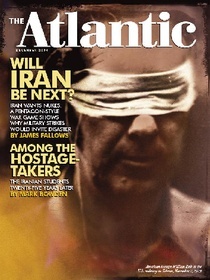
First, the background. Two military airplanes are getting a lot of attention: the A-10 "Warthog" — "Honey Badger" would be a better name — a kind of flying tank that has been crucial in "close air support" missions from the first Gulf War onwards; and the F-35 "Lighting II," a still-in-development multi-purpose airplane that has been plagued by technical problems, production delays, and cost overruns.
As my "Tragedy of the American Military" article argues, the two airplanes don't have a necessary logical connection, since they're meant for different roles. But they have a close political and budgetary link, because first the George W. Bush and now the Obama administration have been trying to phase out the (battle-proven, reliable, relatively cheap) Warthog in part to pay for the (opposite of all those things) Lighting II.
Now the developments, which are genuinely bad.
1) "F-35 Massages Flight Test Results," which is the title of a new article by Giovanni de Briganti in Defense-Aerospace.com. The article in turn draws from a report by the Pentagon's Director of Operational Test and Evaluation documenting on the mounting technical and financial problems for the project.
Last Friday Tony Capaccio reported for Bloomberg that this report, then being sent to Congress, was full of bad news about the F-35. "What is clear is that [the F-35] will finish with deficiencies remaining that will affect operational units,” the story quoted testing director Michael Gilmore as saying. According to the story, "Gilmore warned that unless 'immediate action is taken to remedy these deficiencies,' the aircraft’s ability to 'be effective in combat is at substantial risk.'”
Then on Monday came the Defense-Aerospace.com story, which included the F-35 portion of the report (it is detailed and acronym-dense, but you can read it here) and highlighted something much more damaging than ongoing bugs. Namely, efforts by the F-35 program team to rig the results of their operational tests. The Defense-Aerospace.com report said (emphasis added):
Recent improvements in F-35 reliability figures are due to changes in the way failures are counted and processed, but do not reflect any actual improvement, according to the latest report by the Pentagon’s Director Operational Test & Evaluation....
Three different types of data “massaging” are identified in the report: moving failures from one category to another, less important one; ignoring repetitive failures, thus inflating numbers of failure-free hours; and improper scoring of reliability. In all these instances, data reporting and processing rules were changed during the year for no other reason than to paint a more favorable picture.
Oh, yes, in case you were wondering: despite the mounting problems the Pentagon is expected to request more F-35 purchases in its next budget — 57 for fiscal year 2016, versus the mid-30s this year.
2) Getting involved in A-10 fight is "treason." Last week the Arizona Daily Independent carried what is at face value a shocking report of an Air Force general telling his troops that speaking positively about what the A-10 could do was "treason." According to a followup in DOD Buzz:

Maj. Gen. James Post [right], vice commander of Air Combat Command, was quoted as saying, “If anyone accuses me of saying this, I will deny it … anyone who is passing information to Congress about A-10 capabilities is committing treason” ....
In a response to the news outlet, a spokesman at the command, based at Joint Base Langley-Eustis, Virginia, described the comments to attendees of a recent Tactics Review Board at Nellis Air Force Base in Nevada as “hyperbole.”
A retired Air Force officer named Tony Carr, on a military-related site John Q. Public, said that Gen. Post's comments represented "creeping fascism" within the career military (emphasis in original):
Assuredly not lost on an officer of Post’s intelligence was that his crowd included many A-10 practitioners as well as others possessed of the view that the Air Force owes ground forces the very best Close Air Support possible, and that this is currently only achievable via the A-10. This wasn’t the first time Post had engaged in this particular exposition. He’s reportedly been saying it to groups of A-10 operators for some time.
These comments can be seen as nothing less than an attempt to intimidate subordinates into refraining from exercising their rights to free expression and civic participation.
This is morally reprehensible conduct by someone in a position of such trust and responsibility that it is implausible to think he wouldn’t know better.
Here's the point that makes these controversies more important than any detail involving this or that airplane. From Napoleon onward, and actually long before, commanders and historians of battle have emphasized that moral traits — commitment, cohesion, belief in the rightness of a cause — matter more in combat than simple material strength. Napoleon's famous way of putting this was, "the moral is to the physical as three to one." As weapons of war, the F-35 and the A-10, with their pluses and minuses, are part of the nation's physical arsenal. The patterns revealed as the weapons are purchased, tested, developed, and promoted reveal say something unpleasant about the moral element of our defense.
Want a little more? You could check this report on recent Navy scandals, or this on pension excesses among flag officers. Cheerier reader responses tomorrow.
***
Here is a running index of previous installments
"The Tragedy of the American Military," my article in the Jan-Feb issue. A C-Span interview is here; an NPR "All Things Considered" interview is here; a PBS News Hour interview and segment is here. I will be doing the Bill Maher show tomorrow.
1) Initial responses, including an argument for the draft.
2) Whether Israel comes closer to a civil-military connection than the U.S. does.
3) "Quiet Gratitude, or Dangerous Contempt?" How veterans respond to "thank you for your service."
4) "Actually We Keep Winning." An argument that things are better than I claim.
5) "Get the Hell Back in Your Foxhole." More on the meaning of "thanks."
6) "Showing Gratitude in a Way that Matters." What civilians could do that counts.
7) "Winning Battles, Losing Wars." A response to #4.
8) "The Economic Realities of a Trillion Dollar Budget." What we could, or should, learn from the Soviet Union.
9) "Meanwhile, the Realities." Fancy weapons are sexy. Boring weapons save troops' lives.
10) "Chickenhawks in the News." The 2012 presidential campaign avoided foreign-policy and military issues. What about 2016?
11) "A Failure of Grand Strategy." Half a league, half a league, half a league onward ...
12) "Careerism and Competence," including the testimony of an A-10 pilot who decided to resign.
13) "Vandergriff as Yoda." A modest proposal for shaking things up.
14) "Lions Led by Lambs." On a possible generation gap among military officers.
15) "Is it all up to the vets?" The one you're reading now.
16) "We Are Not Chickenhawks." A critique (of me) from the left.
17) The one you are reading now.
This article was originally published at http://www.theatlantic.com/politics/archive/2015/01/genuinely-bad-news-about-the-f-35-and-the-a-10/384721/






















































